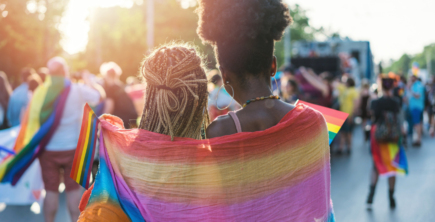
LGBT
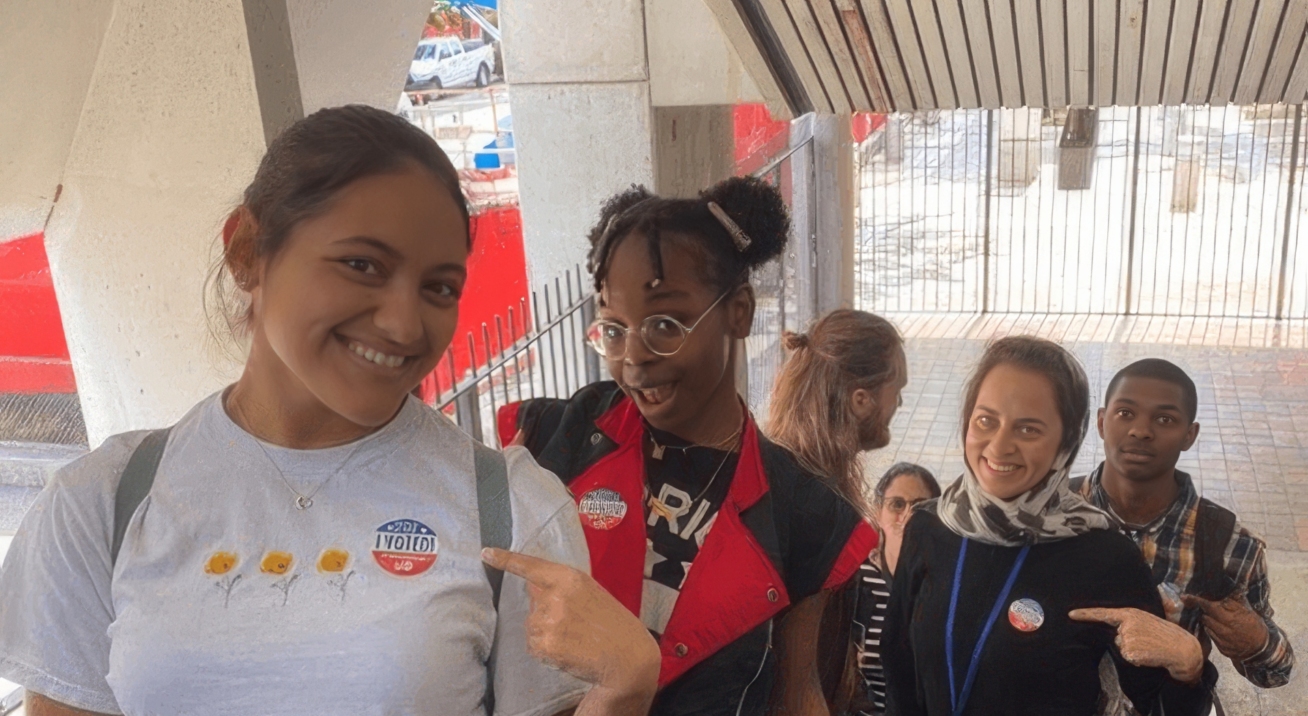
Engage Miami was able to get the young people pictured here excited about voting and facilitated registering them to vote for their first time. Photo courtesy of Briyana Joseph.
While the COVID-19 crisis has put a lid on door knocking and other in-person strategies, if you talk to enough young organizers, you get the idea they aren’t going to let a global pandemic stand in the way of their work.
At age 19, Davonte Johnson is already a five-year veteran of issue-based organizing in Detroit. From the “Fight for $15” to the fights against police brutality and the school-to-prison pipeline, he’s been on the front lines in activating young Detroiters to work for social justice and vote for their values.
Now, he’s working with the grassroots group Detroit Action, a project of Tides Advocacy, to make sure his peers vote in November. “Young people are waking up now that we need to end racism,” Johnson said. “And if that’s something you value, then we’re saying ‘you need to show up.’”
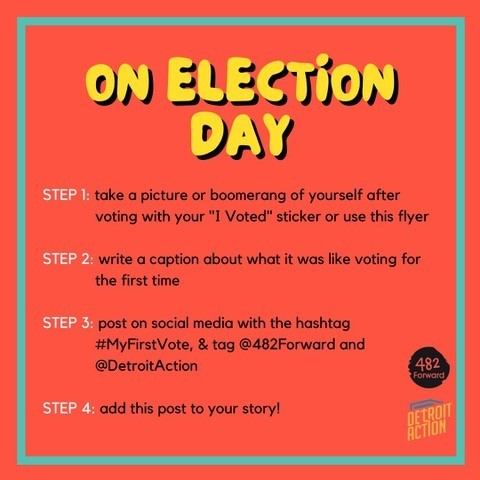
Young people are taking to social media to encourage their peers to vote. Image courtesy of Detroit Action.
In communities across the country, groups like Detroit Action are using phone banking, social media, and other outreach to educate young people about issues and how to register and vote in November. While the COVID-19 crisis has put a lid on door knocking and other in-person strategies, if you talk to enough young organizers, you get the idea they aren’t going to let a global pandemic stand in the way of their work. With so many critical offices and issues on the ballot this November that will directly impact young people’s lives for decades to come, this election is just too important.
Young people involved in this work also will tell you that successful youth organizing can’t be done on the cheap. Groups like Detroit Action need support from funders to hire more organizers, beef up their technology and infrastructure, strengthen their culturally relevant messaging, and stay in front of young people during election seasons and in the years in between. “This work doesn’t just happen,” Johnson said.
Through the Healthy Democracy Fund, Tides is joining with philanthropic partners and movement leaders to invest in organizations and networks that are working to increase youth voting. We’re doing this because young people have shown time and again how they can be a powerful force for progressive change.
The loss of the great John Lewis last month was a reminder of how the civil rights movement was energized by the leadership and involvement of young activists working with the Student Nonviolent Coordinating Committee and other groups. More recently, we’ve witnessed youth power in action. Undocumented young people transformed the conversation in this country on immigration. High school students from Parkland, Florida, and other communities impacted by gun violence changed hearts and minds on that issue. A teenage girl from Sweden became the face of a youth-led global movement for action on climate change. And young activists have powered the Movement for Black Lives.
Of course, each of these movements still faces enormous challenges translating its vision for progress and justice into lasting change—and that’s the point. Youth-led movements need more support to turn their hopes and dreams—as well as their impressive organizing achievements—into concrete and lasting policy wins.
Groups like Detroit Action need support from funders to hire more organizers, beef up their technology and infrastructure, strengthen their culturally relevant messaging, and stay in front of young people during election seasons and in the years in between.
That’s why the Healthy Democracy Fund is so invested in the work of mobilizing young voters on issues such as racial justice, climate change, and more. Among our grantee partners are the Alliance for Youth Organizing, a multi-issue network of grassroots organizations working in communities across the country; United We Dream, the largest youth immigrant network in the country; and the Sunrise Movement Education Fund, which is “building an army of young people to make climate change an urgent priority across America.” We are also partnering with the Movement for Black Lives and its partners in their efforts to educate and mobilize young people to work for racial justice.
All too often, young people are ignored by politicians and issue advocates. Either they assume young people are already on their side, or they spend their resources on TV ads and outreach aimed at older voters who are considered more likely to turn out.
And it’s not just that campaigns brush off young voters. Brianna Cea, chief executive officer and founder of Generation Vote, says young people face a range of unique barriers to voting—from the closure of voting sites on college campuses to laws that prohibit the use of student IDs for voting. “In the conversation about voting rights, people often ignore how lawmakers often try to suppress the youth vote,” Cea said.
With young people either ignored, closed out of the system, or taken for granted, it’s no coincidence that youth turnout rarely approaches the turnout of older folks.
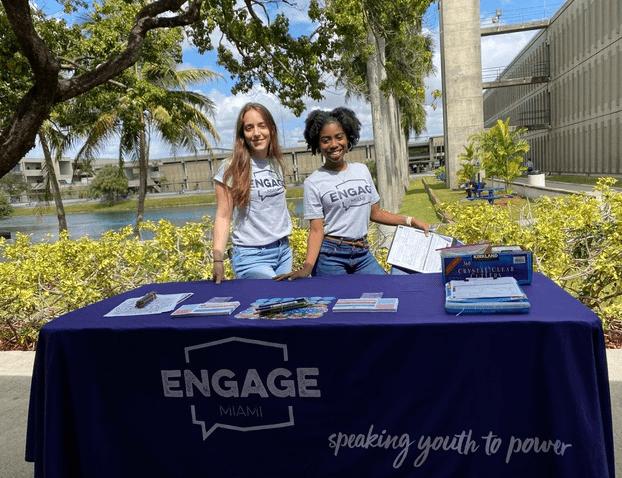
Engage Miami not only registers young people to vote, but also gets young people involved by engaging them to volunteer to prosthelytize the importance of voting to their peers. Image courtesy of Briyana Joseph.
The good news is that young voters are signaling they are intent on closing the gap in participation. A January 2020 Alliance for Youth Action poll showed that 84 percent of registered voters ages 17 to 35 said they will definitely be voting in November. And a recent New York Times article showcased how youth-focused organizing groups from Wisconsin to Texas are registering record numbers of young people to vote and working diligently to get them engaged and involved in their communities.
In Florida, the nonprofit group Engage Miami Civic Foundation has registered thousands of young voters while fighting successfully for early voting sites on college campuses and organizing a wide-ranging program of civic education activities and virtual events. With the onset of the COVID-19 crisis, the group shifted its focus for 2020 to making sure young Miamians vote by mail. Executive Director Rebecca Pelham said the group’s goal right now is to get 25,000 young people to log on to the county elections website to request their vote-by-mail ballots.
All too often, young people are ignored by politicians and issue advocates. Either they assume young people are already on their side, or they spend their resources on TV ads and outreach aimed at older voters who are considered more likely to turn out.
Like Davonte Johnson in Detroit, Pelham says she and her team are seeing a high level of interest and passion among young people about the 2020 election and the issues at stake, including racial justice, college debt, healthcare costs, jobs, climate change, and more. When asked about her message to funders who care about those issues, she said young people hold the key to lasting progressive change. “If we aren’t reaching out in a way that maximizes their power and voice,” Pelham said, “then we are going to miss out on a major moment.”
In November, one in ten eligible voters will be between the ages of 18 and 23; that’s a sharp increase since the last presidential election. When philanthropy is thinking about these young people and their peers, we would be smart not to mistake disillusionment with disengagement. In the middle of the COVID-19 crisis, young people are organizing, marching, demanding accountability, and boldly letting us know what they expect in exchange for their support.
It’s our turn to show up.
Peter Martin is Director of Philanthropy at Tides.
Alex Rojas is Program Manager, Healthy Democracy Fund at Tides.
To learn more about youth groups accelerating the pace for social change and civic engagement email us at [email protected].

LGBT
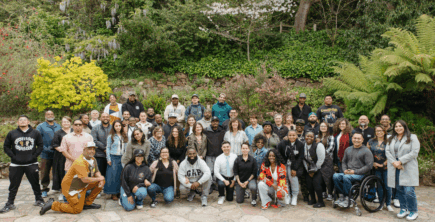
Corporate Partners
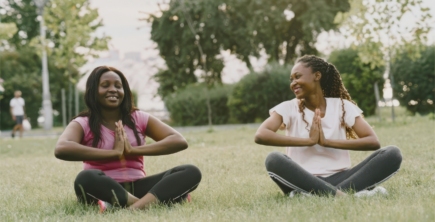
Philanthropy

Read the stories and hear the voices of social change leaders fighting for justice.